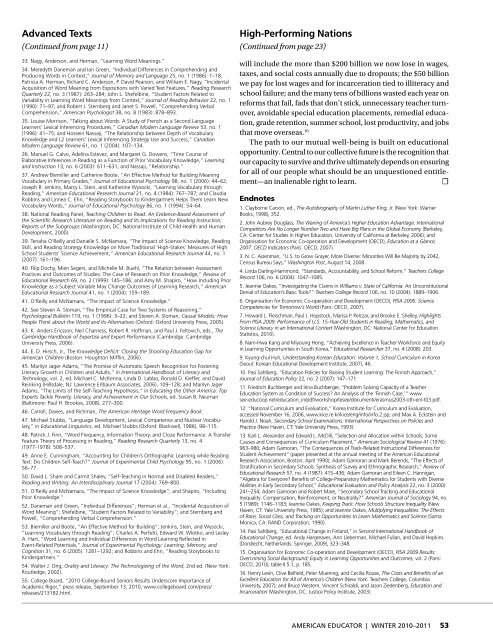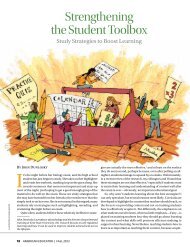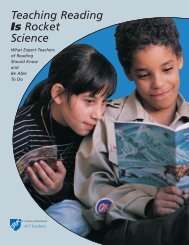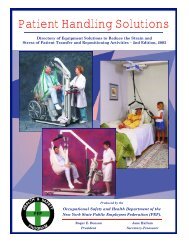American Educator, Winter 2010-11, Vol. 34, No. 4, AFT
American Educator, Winter 2010-11, Vol. 34, No. 4, AFT
American Educator, Winter 2010-11, Vol. 34, No. 4, AFT
Create successful ePaper yourself
Turn your PDF publications into a flip-book with our unique Google optimized e-Paper software.
Advanced Texts<br />
(Continued from page <strong>11</strong>)<br />
33. Nagy, Anderson, and Herman, “Learning Word Meanings.”<br />
<strong>34</strong>. Meredyth Daneman and Ian Green, “Individual Differences in Comprehending and<br />
Producing Words in Context,” Journal of Memory and Language 25, no. 1 (1986): 1–18;<br />
Patricia A. Herman, Richard C. Anderson, P. David Pearson, and William E. Nagy, “Incidental<br />
Acquisition of Word Meaning from Expositions with Varied Text Features,” Reading Research<br />
Quarterly 22, no. 3 (1987): 263–284; John L. Shefelbine, “Student Factors Related to<br />
Variability in Learning Word Meanings from Context,” Journal of Reading Behavior 22, no. 1<br />
(1990): 71–97; and Robert J. Sternberg and Janet S. Powell, “Comprehending Verbal<br />
Comprehension,” <strong>American</strong> Psychologist 38, no. 8 (1983): 878–893.<br />
35. Louise Morrison, “Talking about Words: A Study of French as a Second Language<br />
Learners’ Lexical Inferencing Procedures,” Canadian Modern Language Review 53, no. 1<br />
(1996): 41–75; and Hossein Nassaji, “The Relationship between Depth of Vocabulary<br />
Knowledge and L2 Learners’ Lexical Inferencing Strategy Use and Success,” Canadian<br />
Modern Language Review 61, no. 1 (2004): 107–1<strong>34</strong>.<br />
36. Manuel G. Calvo, Adelina Estevez, and Margaret G. Dowens, “Time Course of<br />
Elaborative Inferences in Reading as a Function of Prior Vocabulary Knowledge,” Learning<br />
and Instruction 13, no. 6 (2003): 6<strong>11</strong>–631; and Nassaji, “Relationship.”<br />
37. Andrew Biemiller and Catherine Boote, “An Effective Method for Building Meaning<br />
Vocabulary in Primary Grades,” Journal of Educational Psychology 98, no. 1 (2006): 44–62;<br />
Joseph R. Jenkins, Marcy L. Stein, and Katherine Wysocki, “Learning Vocabulary through<br />
Reading,” <strong>American</strong> Educational Research Journal 21, no. 4 (1984): 767–787; and Claudia<br />
Robbins and Linnea C. Ehri, “Reading Storybooks to Kindergartners Helps Them Learn New<br />
Vocabulary Words,” Journal of Educational Psychology 86, no. 1 (1994): 54–64.<br />
38. National Reading Panel, Teaching Children to Read: An Evidence-Based Assessment of<br />
the Scientific Research Literature on Reading and Its Implications for Reading Instruction;<br />
Reports of the Subgroups (Washington, DC: National Institute of Child Health and Human<br />
Development, 2000).<br />
39. Tenaha O’Reilly and Danielle S. McNamara, “The Impact of Science Knowledge, Reading<br />
Skill, and Reading Strategy Knowledge on More Traditional ‘High-Stakes’ Measures of High<br />
School Students’ Science Achievement,” <strong>American</strong> Educational Research Journal 44, no. 1<br />
(2007): 161–196.<br />
40. Filip Dochy, Mien Segers, and Michelle M. Buehl, “The Relation between Assessment<br />
Practices and Outcomes of Studies: The Case of Research on Prior Knowledge,” Review of<br />
Educational Research 69, no. 2 (1999): 145–186; and Amy M. Shapiro, “How Including Prior<br />
Knowledge as a Subject Variable May Change Outcomes of Learning Research,” <strong>American</strong><br />
Educational Research Journal 41, no. 1 (2004): 159–189.<br />
41. O’Reilly and McNamara, “The Impact of Science Knowledge.”<br />
42. See Steven A. Sloman, “The Empirical Case for Two Systems of Reasoning,”<br />
Psychological Bulletin <strong>11</strong>9, no. 1 (1996): 3–22; and Steven A. Sloman, Causal Models: How<br />
People Think about the World and Its Alternatives (Oxford: Oxford University Press, 2005).<br />
43. K. Anders Ericsson, Neil Charness, Robert R. Hoffman, and Paul J. Feltovich, eds., The<br />
Cambridge Handbook of Expertise and Expert Performance (Cambridge: Cambridge<br />
University Press, 2006).<br />
44. E. D. Hirsch, Jr., The Knowledge Deficit: Closing the Shocking Education Gap for<br />
<strong>American</strong> Children (Boston: Houghton Mifflin, 2006).<br />
45. Marilyn Jager Adams, “The Promise of Automatic Speech Recognition for Fostering<br />
Literacy Growth in Children and Adults,” in International Handbook of Literacy and<br />
Technology, vol. 2, ed. Michael C. McKenna, Linda D. Labbo, Ronald D. Kieffer, and David<br />
Reinking (Hillsdale, NJ: Lawrence Erlbaum Associates, 2006), 109–128; and Marilyn Jager<br />
Adams, “The Limits of the Self-Teaching Hypothesis,” in Educating the Other America: Top<br />
Experts Tackle Poverty, Literacy, and Achievement in Our Schools, ed. Susan B. Neuman<br />
(Baltimore: Paul H. Brookes, 2008), 277–300.<br />
46. Carroll, Davies, and Richman, The <strong>American</strong> Heritage Word Frequency Book.<br />
47. Michael Stubbs, “Language Development, Lexical Competence and Nuclear Vocabulary,”<br />
in Educational Linguistics, ed. Michael Stubbs (Oxford: Blackwell, 1986), 98–<strong>11</strong>5.<br />
48. Patrick J. Finn, “Word Frequency, Information Theory, and Cloze Performance: A Transfer<br />
Feature Theory of Processing in Reading,” Reading Research Quarterly 13, no. 4<br />
(1977-1978): 508–537.<br />
49. Anne E. Cunningham, “Accounting for Children’s Orthographic Learning while Reading<br />
Text: Do Children Self-Teach?” Journal of Experimental Child Psychology 95, no. 1 (2006):<br />
56–77.<br />
50. David L. Share and Carmit Shalev, “Self-Teaching in <strong>No</strong>rmal and Disabled Readers,”<br />
Reading and Writing: An Interdisciplinary Journal 17 (2004): 769–800.<br />
51. O’Reilly and McNamara, “The Impact of Science Knowledge”; and Shapiro, “Including<br />
Prior Knowledge.”<br />
52. Daneman and Green, “Individual Differences”; Herman et al., “Incidental Acquisition of<br />
Word Meaning”; Shefelbine, “Student Factors Related to Variability”; and Sternberg and<br />
Powell, “Comprehending Verbal Comprehension.”<br />
53. Biemiller and Boote, “An Effective Method for Building”; Jenkins, Stein, and Wysocki,<br />
“Learning Vocabulary through Reading”; Charles A. Perfetti, Edward W. Wlotko, and Lesley<br />
A. Hart, “Word Learning and Individual Differences in Word Learning Reflected in<br />
Event-Related Potentials,” Journal of Experimental Psychology: Learning, Memory, and<br />
Cognition 31, no. 6 (2005): 1281–1292; and Robbins and Ehri, “Reading Storybooks to<br />
Kindergartners.”<br />
54. Walter J. Ong, Orality and Literacy: The Technologizing of the Word, 2nd ed. (New York:<br />
Routledge, 2002).<br />
55. College Board, “<strong>2010</strong> College-Bound Seniors Results Underscore Importance of<br />
Academic Rigor,” press release, September 13, <strong>2010</strong>, www.collegeboard.com/press/<br />
releases/213182.html.<br />
High-Performing Nations<br />
(Continued from page 23)<br />
will include the more than $200 billion we now lose in wages,<br />
taxes, and social costs annually due to dropouts; the $50 billion<br />
we pay for lost wages and for incarceration tied to illiteracy and<br />
school failure; and the many tens of billions wasted each year on<br />
reforms that fail, fads that don’t stick, unnecessary teacher turnover,<br />
avoidable special education placements, remedial education,<br />
grade retention, summer school, lost productivity, and jobs<br />
that move overseas. 16<br />
The path to our mutual well-being is built on educational<br />
opportunity. Central to our collective future is the recognition that<br />
our capacity to survive and thrive ultimately depends on ensuring<br />
for all of our people what should be an unquestioned entitlement—an<br />
inalienable right to learn. ☐<br />
Endnotes<br />
1. Clayborne Carson, ed., The Autobiography of Martin Luther King, Jr. (New York: Warner<br />
Books, 1998), 352.<br />
2. John Aubrey Douglass, The Waning of America’s Higher Education Advantage: International<br />
Competitors Are <strong>No</strong> Longer Number Two and Have Big Plans in the Global Economy (Berkeley,<br />
CA: Center for Studies in Higher Education, University of California at Berkeley, 2006); and<br />
Organisation for Economic Co-operation and Development (OECD), Education at a Glance,<br />
2007: OECD Indicators (Paris: OECD, 2007).<br />
3. N. C. Aizenman, “U.S. to Grow Grayer, More Diverse: Minorities Will Be Majority by 2042,<br />
Census Bureau Says,” Washington Post, August 14, 2008.<br />
4. Linda Darling-Hammond, “Standards, Accountability, and School Reform,” Teachers College<br />
Record 106, no. 6 (2004): 1047–1085.<br />
5. Jeannie Oakes, “Investigating the Claims in Williams v. State of California: An Unconstitutional<br />
Denial of Education’s Basic Tools?” Teachers College Record 106, no. 10 (2004): 1889–1906.<br />
6. Organisation for Economic Co-operation and Development (OECD), PISA 2006: Science<br />
Competencies for Tomorrow’s World (Paris: OECD, 2007).<br />
7. Howard L. Fleischman, Paul J. Hopstock, Marisa P. Pelczar, and Brooke E. Shelley, Highlights<br />
From PISA 2009: Performance of U.S. 15-Year-Old Students in Reading, Mathematics, and<br />
Science Literacy in an International Context (Washington, DC: National Center for Education<br />
Statistics, <strong>2010</strong>).<br />
8. Nam-Hwa Kang and Miyoung Hong, “Achieving Excellence in Teacher Workforce and Equity<br />
in Learning Opportunities in South Korea,” Educational Researcher 37, no. 4 (2008): 203.<br />
9. Kyung-chul Huh, Understanding Korean Education: <strong>Vol</strong>ume 1, School Curriculum in Korea<br />
(Seoul: Korean Educational Development Institute, 2007), 46.<br />
10. Pasi Sahlberg, “Education Policies for Raising Student Learning: The Finnish Approach,”<br />
Journal of Education Policy 22, no. 2 (2007): 147–171.<br />
<strong>11</strong>. Friedrich Buchberger and Irina Buchberger, “Problem Solving Capacity of a Teacher<br />
Education System as Condition of Success? An Analysis of the ‘Finnish Case,’” www.<br />
see-educoop.net/education_in/pdf/workshop/tesee/dokumenti/erasmus2003-oth-enl-t03.pdf.<br />
12. “National Curriculum and Evaluation,” Korea Institute for Curriculum and Evaluation,<br />
accessed <strong>No</strong>vember 16, 2006, www.kice.re.kr/kice/eng/info/info.2.jsp; and Max A. Eckstein and<br />
Harold J. <strong>No</strong>ah, Secondary School Examinations: International Perspectives on Policies and<br />
Practice (New Haven, CT: Yale University Press, 1993).<br />
13. Karl L. Alexander and Edward L. McDill, “Selection and Allocation within Schools: Some<br />
Causes and Consequences of Curriculum Placement,” <strong>American</strong> Sociological Review 41 (1976):<br />
963–980; Adam Gamoran, “The Consequences of Track-Related Instructional Differences for<br />
Student Achievement” (paper presented at the annual meeting of the <strong>American</strong> Educational<br />
Research Association, Boston, April 1990); Adam Gamoran and Mark Berends, “The Effects of<br />
Stratification in Secondary Schools: Synthesis of Survey and Ethnographic Research,” Review of<br />
Educational Research 57, no. 4 (1987): 415–436; Adam Gamoran and Eileen C. Hannigan,<br />
“Algebra for Everyone? Benefits of College-Preparatory Mathematics for Students with Diverse<br />
Abilities in Early Secondary School,” Educational Evaluation and Policy Analysis 22, no. 3 (2000):<br />
241–254; Adam Gamoran and Robert Mare, “Secondary School Tracking and Educational<br />
Inequality: Compensation, Reinforcement, or Neutrality?” <strong>American</strong> Journal of Sociology 94, no.<br />
5 (1989): <strong>11</strong>46–<strong>11</strong>83; Jeannie Oakes, Keeping Track: How Schools Structure Inequality (New<br />
Haven, CT: Yale University Press, 1985); and Jeannie Oakes, Multiplying Inequalities: The Effects<br />
of Race, Social Class, and Tracking on Opportunities to Learn Mathematics and Science (Santa<br />
Monica, CA: RAND Corporation, 1990).<br />
14. Pasi Sahlberg, “Educational Change in Finland,” in Second International Handbook of<br />
Educational Change, ed. Andy Hargreaves, Ann Lieberman, Michael Fullan, and David Hopkins<br />
(Dordrecht, Netherlands: Springer, 2009), 323–<strong>34</strong>8.<br />
15. Organisation for Economic Co-operation and Development (OECD), PISA 2009 Results:<br />
Overcoming Social Background; Equity in Learning Opportunities and Outcomes, vol. 2 (Paris:<br />
OECD, <strong>2010</strong>), table II.5.1, p. 185.<br />
16. Henry Levin, Clive Belfield, Peter Muennig, and Cecilia Rouse, The Costs and Benefits of an<br />
Excellent Education for All of America’s Children (New York: Teachers College, Columbia<br />
University, 2007); and Bruce Western, Vincent Schiraldi, and Jason Ziedenberg, Education and<br />
Incarceration (Washington, DC: Justice Policy Institute, 2003).<br />
AMERICAN EDUCATOR | WINTER <strong>2010</strong>–20<strong>11</strong> 53





